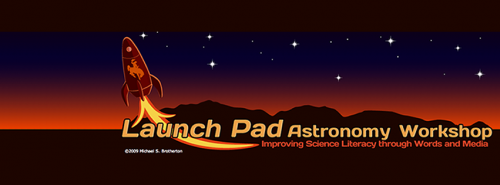Launch Pad Astronomy Workshop: A Stellar Program for Writers
Author: Gabrielle Harbowy
July 25, 2014
Launch Pad Astronomy Workshop is a week-long intensive course for established writers. It’s also been one of the best experiences of my life.
Launch Pad is the brainchild of Professor Michael Brotherton, a published science fiction author and an astronomer at the University of Wyoming in beautiful, high-altitude Laramie. While much of science outreach focuses on getting children excited about science education, Dr. Brotherton chose to focus on educating the people who have the most power to reach both children and adults: the authors, editors, and designers of the books they read, the media they watch, and the games they play.
Each summer, about 12-16 media professionals—writers, editors, game designers, and media veterans with audiences of all types—travel to Laramie for an intensive crash course, in which they learn how to portray science more accurately for their audiences. “For better or worse,” Brotherton said on our first day in the University of Wyoming Business Center classroom that would become our home away from home, “people learn from entertainment. Things we see through strong narratives stick with us, right or wrong.”
 With nearly 120 alumni passing through Launch Pad’s doors since its inception in 2007, the program’s reach is, well, astronomical. Launch Pad attendees are New York Times Bestsellers, Hugo and Nebula Award winners, video and tabletop game designers, television and movie screenwriters, stand-up comedians, military historians, editors, and more… and not just creators of science fiction, either. Knowing science fact is equally important in fantasy (where too many people write werewolves without understanding the phases of the moon), young adult and middle grade fiction (whether in depictions of science classes or in more plot-related applications), prime time television, mainstream movies, and literary fiction.
With nearly 120 alumni passing through Launch Pad’s doors since its inception in 2007, the program’s reach is, well, astronomical. Launch Pad attendees are New York Times Bestsellers, Hugo and Nebula Award winners, video and tabletop game designers, television and movie screenwriters, stand-up comedians, military historians, editors, and more… and not just creators of science fiction, either. Knowing science fact is equally important in fantasy (where too many people write werewolves without understanding the phases of the moon), young adult and middle grade fiction (whether in depictions of science classes or in more plot-related applications), prime time television, mainstream movies, and literary fiction.
This year’s lectures covered topics including: the seasons, phases of the moon, historical astronomy, misconceptions, the electromagnetic spectrum, gravity and orbits, planets, stars, galaxies, and cosmology. Extra time was set aside to discuss examples of science used well (and not so well!) in science fiction and other popular media, as well as to address topics of immediate importance to individual attendees. If someone’s novel-in-progress features a Mars landing, the instructors are happy to give Mars a little extra time in the curriculum. And crowd-sourced knowledge can’t be discounted, either. Living, eating, and learning with a dozen other people, all equally as excited about space, leisure-time conversations often turned to discussions of our works in progress, our understanding of the material, and our creative process. Often, another attendee’s valuable insight, or rephrasing of a difficult concept, or viewing/reading recommendation, was the “a-ha!” moment someone needed.
Perhaps the most amazing experience out of an amazing week was the visit to WIRO, the Wyoming Infrared Observatory. The moment a call went up for a volunteer to stay overnight at the telescope, my hand was in the air. All of us caravanned up the mountain at sunset and got to experience the 2.3-meter infrared telescope hands-on, but three of us remained behind when the rest of the group went home. All night, we eagerly let a recent graduate of the astronomy program put us to work. We positioned the telescope, took images and spectroscopy, and kept the telescope focused on the brightest part of a distant star. She answered all our crazy questions and gave us a vividly real look into the sort of science experience we only see dramatized in movies. (Spoiler: astronomers spend as much time watching cat videos on the Internet as writers do.)
A generous grant from the Space Telescope Science Institute paid for the workshop this year–we only had to make our own way to the Denver airport. Transportation, room, and board were all covered for us. We slept in the university dormitory (in private rooms, linens provided) and ate at the dining hall.
Equal to the Launch Pad education is the opportunity for socialization. It took a day or two for us to all move on from introducing ourselves as writers; in the real world, that’s a distinction that sets us apart and isn’t always understood. At Launch Pad, we were all among our peers. I wasn’t the only writer, the only editor, the only woman interested in science, or the only queer. In a complete turnabout from my own college experience, I got to spend a week on campus feeling like I belonged.
Instructor Christian Ready noted that while attendees get a lot out of Launch Pad, the instructors get even more, because they get to meet and spend time with an amazing group of talented individuals year after year. Now that I’m back home from my week of space camp and I can’t just pad out to the common room in my socks and search for exoplanets on my laptop while I share rejection letter stories with fifteen of my new best friends…I certainly see what he means.
Launch Pad Astronomy Workshop on Facebook.
Twitter: @LaunchpadAstro
Website


